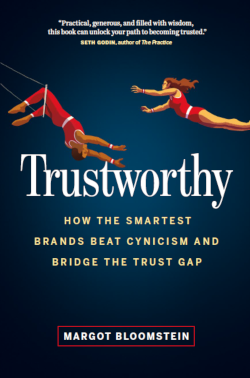 You can enter to win a free copy of Margot Bloomstein’s new book, Trustworthy: How the Smartest Brands Beat Cynicism and Bridge the Trust Gap, by leaving a comment on this blog post. Tell us what brand you trust and why. You’ll then be entered into a random drawing to be held on Saturday, May 8, 2021. One lucky winner will be sent a free copy of this terrific new release.
You can enter to win a free copy of Margot Bloomstein’s new book, Trustworthy: How the Smartest Brands Beat Cynicism and Bridge the Trust Gap, by leaving a comment on this blog post. Tell us what brand you trust and why. You’ll then be entered into a random drawing to be held on Saturday, May 8, 2021. One lucky winner will be sent a free copy of this terrific new release.
To regain the trust of consumers and citizens, marketers talk about empathy and authenticity, transparency and accountability. But how do you get beyond those buzzwords? Margot Bloomstein offers an actionable framework focused on voice, volume, and vulnerability. Voice is the personality and style which should be consistent across time and channels. Volume is how much you communicate and knowing when enough is enough. Vulnerability is the risk you take in telling the truth, reaching to connect with your audience, prototyping in public, and taking responsibility for mistakes when they happen.
Bloomstein shows with dozen of case studies how to employ concrete tactics to regain trust, respect, and customer loyalty.
Airbnb, Zoom, the FBI, TED, the United Kingdom Government Digital Service, The New York Times, America’s Test Kitchen, local election commissions, and other organizations have all embraced strategies of content and design that transform their audiences into empowered decision-makers. Smart organizations teach their audiences to evaluate product options, engage in continuous self-education, and make more informed choices.
She believes business can be a force for good. And she provides practical advice on how to lead your organization and audience from cynicism toward something far more productive: hope.
